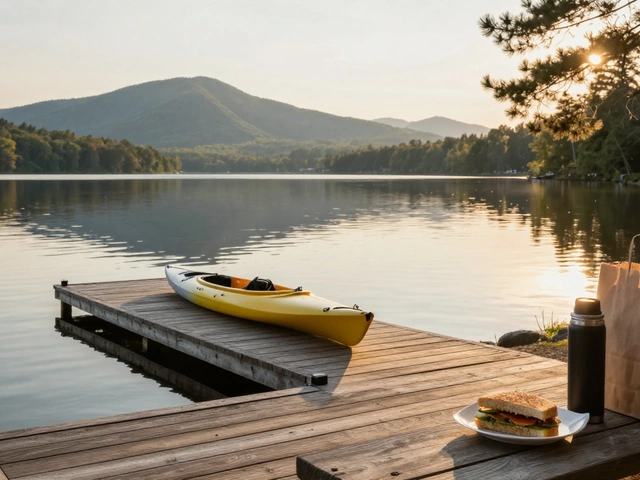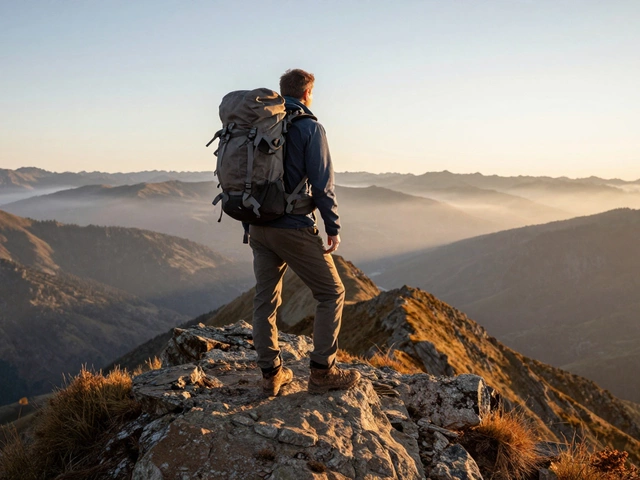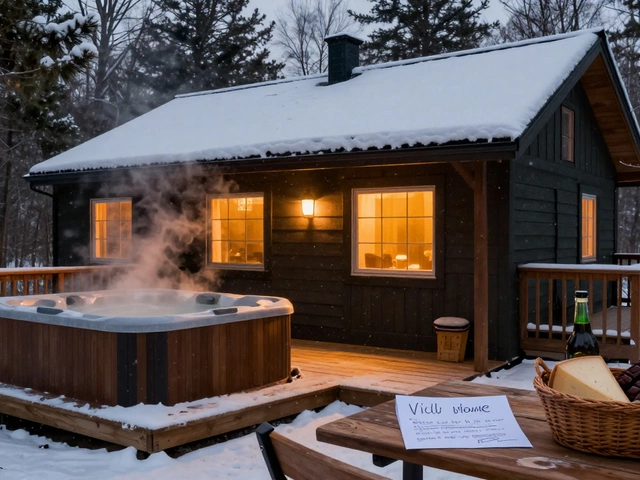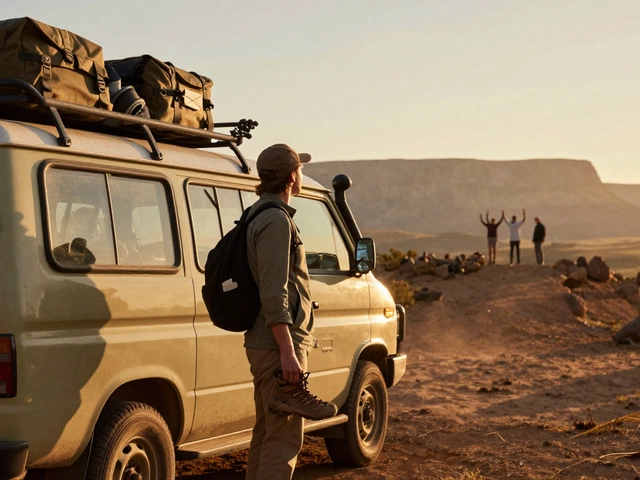Ever have that guilty feeling while lounging poolside on vacation, wondering if you just blew a hole in your bank account? The kind where you check your phone hoping nobody has texted you about a drained debit card? That’s exactly what money guru Dave Ramsey’s fans hope to avoid. And let’s be real, who wants to come home from a dreamy getaway to a mountain of credit card debt? That’s the sort of trip that ages you faster than a red-eye flight with a teething toddler (been there, got the T-shirt, got the eye bags).
Dave Ramsey’s Philosophy on Vacation Spending
Dave Ramsey is not shy when it comes to opinions about money. He’s known for being tough, sometimes even blunt, and that’s exactly what draws so many people to his advice. For Dave, vacations are great—just not if they put you in debt. The magic word here is budget. Seriously, it’s the golden ticket for just about anything in his financial universe, and yes, that means travel, too.
He isn’t suggesting you never travel. He’s not anti-fun. What he is, though, is absolutely against financing trips with credit cards or dipping into emergency funds. He’s famous for saying things like, “Debt is dumb and cash is king.” If you’re betting on a vacation making you happy while sacrificing your financial security, that’s a gamble Dave won’t co-sign. His stance: if you can’t afford it in cash, you can’t afford it…yet.
Here’s a quirky fact: in several episodes of his radio show, callers would ask about saving up for Disney trips or anniversary cruises. His response? You need to set aside every single dollar ahead of time. For families, he even suggests making it a group mission—put a big jar in the kitchen labeled “Vacation Fund” and drop in spare change. It sounds almost old-school, but it’s a smart psychological trick. Everyone from the five-year-old to your teenager can see the vacation dream building up, coin by coin. Not so glamorous in the moment, but incredibly satisfying later. (Confession: my kid Callista loves throwing coins in our "Summer Road Trip" jar.)
Ramsey champions what he calls “sinking funds.” This means you set up a separate savings account or envelope just for vacations, apart from other needs. Every paycheck, you squirrel away a set amount, big or small. The idea is to keep that money off-limits so it doesn’t inadvertently become gas money, a pizza splurge, or, ahem, school supply emergency. It sounds restrictive, but people who follow this say it gives them total peace of mind to spend freely on vacation, knowing regular bills are already paid.
There’s a stat Ramsey loves to quote: the average American spends about $1,919 on summer vacations, according to a 2024 ValuePenguin report. That’s a huge chunk for many families, especially if it’s not accounted for in the budget. He argues that if you can take a trip for half that cost and avoid debt, that’s a win.
He’s also not afraid to call out travel hacks that sound clever but spell financial trouble. Think opening credit cards for airline miles or booking trips now and "paying later." Ramsey warns these tricks often backfire. Sure, getting bonus points feels good, but if you’re tempted to overspend, it turns into a headache later. His fans love his analogy that travel debt is like a hangover after the party—the fun is nice, but the pain isn’t worth it.

Planning Ramsey-Approved Vacations
Let’s break down what “Ramsey-approved” trips actually look like. The first unbreakable rule: vacation gets its own line in the monthly budget. That means before even booking an Airbnb or buying sunscreen, you figure out what’s realistic. No guessing, no “it’ll work out somehow.” It’s the difference between coming home happy and coming home haunted by bills.
Ramsey’s approach starts months in advance. He loves goals, so he recommends setting a travel date and working backwards. If you’ve got a trip planned for eight months out, dividing the total by eight tells you what to stash away each month. This makes even big trips feel possible. For example, planning a $2,000 vacation? Set aside $250 a month and in eight months, you’re golden.
If you can pull it off, embrace the idea of a “staycation.” Dave is a huge fan of making memories close to home when funds are tight. It might sound boring, but with the right attitude, even discovering a hidden biking trail or backyard camping can pack more laughs (and fewer receipts) than a trip to Paris. He gets that after years of pandemic living, most of us are starved for new scenery, but he’ll remind you: there’s no vacation on earth worth digging a financial hole.
A fun little fact—one of his radio show listeners shared that their family picks vacation destinations based on discounts or deals they receive in local flyers. Sometimes that means swapping the big-ticket amusement park for a lakeside cabin two hours away but scoring triple the fun because the stress isn’t lurking in their wallets.
Ramsey stresses comparison shopping. This isn’t a quick scroll on travel apps. He means getting serious: research flights, hotels, package deals, and attractions to find the lowest prices. If you book early and travel off-peak, you’ll save a bundle. Want specific numbers? According to TripAdvisor’s 2024 report, booking flights in January or September saves an average of 20% compared to booking in late spring.
He’s all about transparency with your travel companions. Set expectations early: that means grown-ups need to be honest if the spa isn’t happening, and the kids may need to swap theme park meals for picnics. It’s way easier to get buy-in if everyone knows the boundaries upfront.
Here’s a smart move—not something most people do—try using only cash on vacation. Leave the credit cards in your hotel’s safe or (better) at home. Dave calls this the “cash envelope” method: figure out how much you want to spend each day, tuck it into separate envelopes, and that’s your daily limit. Run out by lunchtime? That’s a hint to check for cheap local eats instead of swinging by resort restaurants. It sounds extreme, but it can make you get creative. Suddenly, a picnic lunch in the park or splitting a dessert feels like a little adventure.
If you do splurge, Dave says make it memorable, not mindless. Maybe your one special meal is a fancy dinner or you treat the kids to a goofy souvenir photo. The key is intentional spending. You’ll remember these splurges because they don’t blur into a haze of impulse buys.
Here’s a quick data snapshot for how Americans budget for vacations:
| Vacation Budget Method | Percentage of Travelers (2024) |
|---|---|
| Saved specifically for trip | 50% |
| Put all/part on credit card | 38% |
| Used tax refund or bonus | 10% |
| Other (gifts, splitting with family, etc.) | 2% |
Some Ramsey fans swear by apps that round up purchases and funnel the change into their vacation savings. Others tell stories about selling unused gear or clutter online to fund dream trips. He loves this kind of hustle—it stresses personal responsibility and makes the end goal sweeter. Bonus tip: If your employer offers bonuses or cash rewards, earmark some or all of that money for travel, even if it slows down your timeline.
And if a surprise expense wipes out your travel fund? Dave’s advice is simple: reschedule or downsize. Life throws curveballs. A vacation should never come at the expense of missed rent, late car payments, or skipping insurance. Travel when it works, not because ‘it’s tradition’ or ‘the kids will be disappointed.’

Making Lasting Memories Without Financial Hangovers
The truth is, Dave Ramsey knows that all the budgeting in the world won’t fix chasing Instagram-worthy vacations instead of making memories that matter to your family. He talks a lot about experiences over things—which doesn’t mean skydiving in Patagonia, especially if money is tight. For him, the joy of travel comes from connection, new experiences, and a break from routine, not maxing out a credit card or competing with what you see online.
One trick Ramsey recommends is giving the trip a story before you even go. You and your family decide what the ‘theme’ or ‘highlight’ of your vacation will be. Will it be the road trip playlists? The hunt for the world’s best ice cream? Making a scrapbook of goofy selfies? Planning ahead means you’ll remember what’s important to you, not just chasing whatever’s trending.
He’s also big on building anticipation (which research shows is just as enjoyable as the vacation itself). When you count down together, plan outfits, or build wish lists of places to explore, you’re squeezing every drop of joy from the experience—for free! (Pro tip: Research by Cornell University found that the anticipation of an upcoming experience makes people happier than waiting for a material purchase.)
Travel doesn’t have to be fancy. Maybe you swap a pricey plane ticket for a quirky road trip to a nearby national park. Or plan theme nights at home leading up to your vacation—Hawaiian shirts for a backyard luau, anyone?—to stretch out the fun. If you involve everyone in planning, especially kids, the memories stick even more.
Don’t discount the psychological weight of truly paying for a trip before you take it. Callista still talks about the little victory dances we did when our vacation jar hit each $100 milestone. It’s wild how much more you appreciate each dollar on the road when you’ve watched it add up back home. That’s something you just can’t replicate if a trip comes courtesy of your future self’s credit statement.
Ever compare vacation memories with friends? Research by the American Psychological Association found that people remember vacations more fondly when they focused on connection and novel experiences, not how much they spent. The luxury suite fades in memory. That time you all got caught in the rain hiking? Or tried spaghetti ice cream because the kids dared you? That’s the stuff people cherish (even if you crammed into a budget motel to make it work).
And if your trip budget is modest? You might actually be ahead of the game. FOMO is real, but studies show that people who plan vacations within their means report less stress, stronger family bonds, and—get this—feel richer in memories. Maybe it’s counter-intuitive, but a simple week at a rented cabin, with no new gadgets or souvenir stress, usually leaves you feeling lighter, freer, and just as satisfied as the folks who went five-star all the way. Sometimes more.
Here are some quick tips Ramsey families swear by:
- Plan picnics instead of pricey meals out at least once a day.
- Schedule free or low-cost activities every day—think hikes, free museum days, street festivals, or local swim spots.
- Set a souvenir budget for everyone, and stick to it. Bonus points for homemade mementos (seashell hunts, pressed flowers in a travel notebook, etc).
- Choose a "splurge day"—one special meal or excursion, rather than constant miniature splurges that add up fast.
- Keep expectations honest and open with travel partners—mismatched hopes cause way more drama than missed flights.
- If you really want to stretch that budget, often the off-season means better deals and smaller crowds—win-win.
- Take lots of pictures and jot down small details every night. What was the funniest thing that happened today? What surprised you most?
Vacations should be a break, not a burden. Dave’s loudest message: a debt-free trip is relaxing because you aren’t dragging stress home with your suitcase. If you find yourself staring at your bank app instead of the sunset, something’s gone sideways. Follow his lead, set that strict but guilt-free vacation budget, and the best memories won’t leave you with any regrets.






